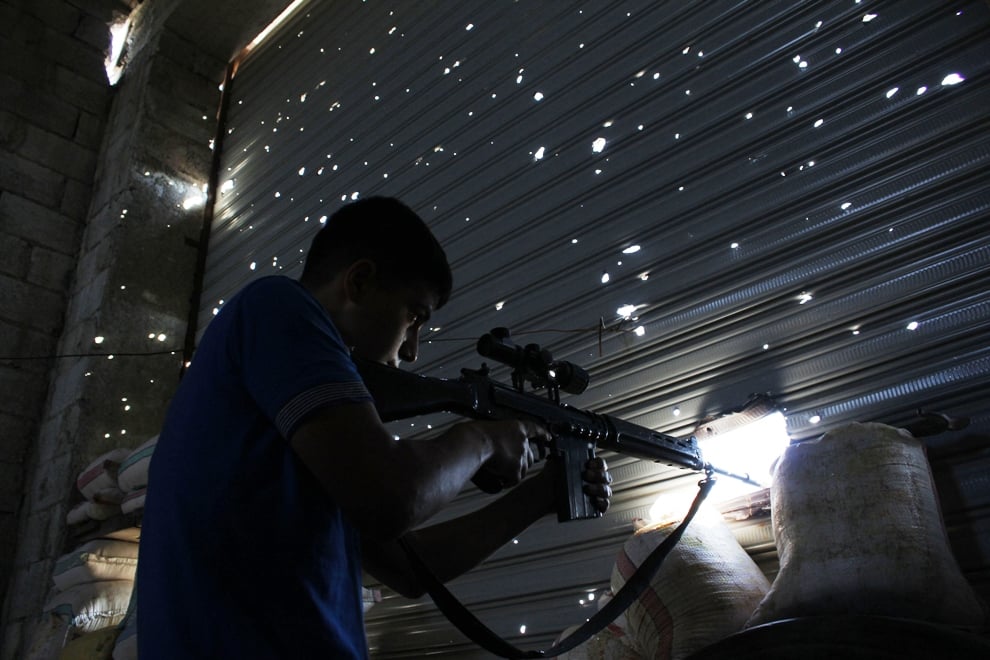
Several rebel brigades, including a contingent of the al Qaeda-linked Nusra Front, swept into the town of Maaloula in the Qalamoun mountains on Wednesday after overrunning a roadblock manned by troops and militia loyal to Syrian President Bashar al Assad, the sources said.
The attack highlighted the delicate position of the Christian minority in Syria, where members of the clerical hierarchy have expressed public support for Assad.
The Christian community, while fearing a takeover, has remained largely in the sidelines since 2001, when it staged peaceful protests against four decades of rule by the Assad family.
Few Christians have taken up arms in the civil war that has torn Syria over the past two and a half years, which broadly pits Assad's Alawite minority, an offshoot of Shia Islam, against the Sunni majority.
A sizeable number of the inhabitants of Maaloula, as well as Sarkha and Jabaadeen, two nearby Sunni towns, still speak Aramaic, the language of Christ.
"That roadblock at the entrance of Maaloula started hitting our mountain position a few days ago. It was silenced. We never had any intention of staying in Maaloula," said rebel commander Abu Khaled from the Baba Amro Revolutionaries Brigade, named after a district of the city of Homs to the north.
Most people in Maaloula fled when the fighting erupted around the roadblock and Syrian fighters bombarded the area on Wednesday. Ten Assad loyalists were killed, but no death toll was immediately available for the rebel side, activists said.
"An army unit eliminated members of a terrorist group belonging to the al Nusra Front northeast of Maaloula and destroyed the tools they use in their crimes," said Syria's official state news agency. Restrictions by Syrian authorities on independent media make verifying these accounts difficult.
Rebel brigades have intensified their operations in the past week against army bases in the foothills of the Qalamoun mountains.
Rebels emboldened
The rebels have been emboldened by Assad's forces retrenching in response to the threat of US military action in the wake of the nerve gas attack on Damascus districts that killed hundreds of civilians, according to opposition sources.
Samia Elias, a resident who stayed in Maaloula, said by phone that Syrian troops and the al-Lijan al-Shaabiya, a pro-Assad militia composed of people from Maaloula, briefly exchanged fire after the rebels had left.
"They are blaming each other for the roadblock and those manning it having been wiped out," she said.
"For months the rebels have been around Maaloula but there has been a sort of an understanding with the townspeople that they would not enter. To be fair, they do not seem to have touched churches or homes."
Maaloula has several churches and important monasteries as well as the Greek Orthodox nunnery Mar Thecla, visited by many Christians and Muslims, drawn by its reputation as a holy place where the sick would be miraculously healed.
Pelagia Sayaf, the Mother Superior at Mar Thecla, told Lebanon's al-Jadid television that reports of Christian holy places being pillaged by rebels were not accurate.
However, video footage showed a rebel fighter firing a machine gun from the centre of Maaloula into a cliff, and a group of rebels carrying rocket propelled grenades and flashing victory signs in the centre of the town.
"Maaloula has been totally cleansed from the dogs of Bashar," a rebel says in one of the videos.
Other footage showed a rebel commander instructing a group of fighters not to target civilians or the Christian symbols in the town.
"The rebels have achieved their mission of removing the roadblocks surrounding Maaloula," said Faek al-Mir, a Syrian opposition campaigner. "We ask all the residents who have left the town to go back. Their passage back is safe."
Some Christians have been prominent in their opposition to Assad and his late father, Hafez al-Assad. But many fear they will be dominated by hardliners and their livelihood destroyed if Assad is toppled.
The Alawite minority's grip on power was cemented in the 1960s by the elder Assad, who forged complex alliances with the Christian ecclesiastical establishment, Sunni clerics and members of the Sunni merchant class in Damascus and Aleppo.
Syria has about 850,000 Christians, about 4.5 percent of the population. Of those, about 400,000 are Catholics of the Syrian, Greek Melkite, Maronite, and Chaldean and Armenian churches.

1732102112-0/BeFunky-collage-(77)1732102112-0-165x106.webp)



1732101971-1/Copy-of-Untitled-(53)1732101971-1-270x192.webp)


1732079997-0/BeFunk_§_]__-(7)1732079997-0.jpg)

1732090878-3/Untitled-design-(22)1732090878-3-270x192.webp)






COMMENTS
Comments are moderated and generally will be posted if they are on-topic and not abusive.
For more information, please see our Comments FAQ